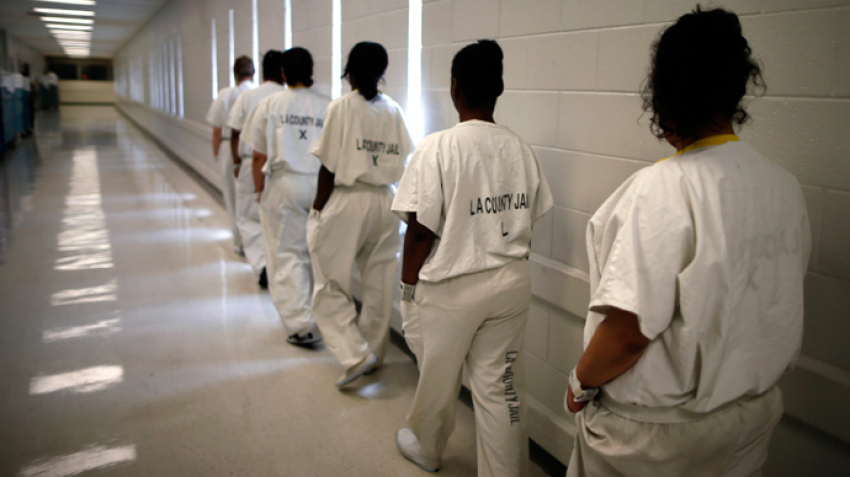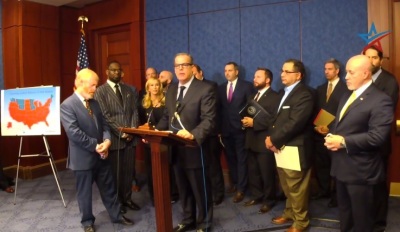Faith leaders counter critics of prison reform bill: 'The opposition's solution is to do nothing'

Criminal justice reform activists and faith leaders can smell the end zone as they sit on the “5-yard line” of passing what could be the most comprehensive prison reform bill in decades. But a few staunch “tough-on-crime” conservatives in the Senate stand in their way.
Pushing to get the FIRST STEP Act passed in the final weeks before the end of the current Congress, conservatives, faith leaders and former federal prosecutors gathered at the U.S. Capitol on Thursday to issue one last call for conservatives in Congress to back the bipartisan legislation.
The bill would primarily create more opportunities for federal prisoners to earn time credits by participating in recidivism reduction programs to help better prepare them for life after their release. The bill would enable evidence-based rehabilitation programs like the Prison Fellowship to be utilized in federal prisons nationwide.
Among a number of other things, the bill would reduce some mandatory minimum sentences for low-level, nonviolent drug crimes that have led to disproportional sentences for thousands across the country.
Although the bill is backed by strong conservatives like Republican Sens. Mike Lee of Utah and Tim Scott of South Carolina, other conservative senators like Tom Cotton of Arkansas and John Kennedy of Louisiana have maintained their opposition. Another version of the bill passed in the House earlier this year.
“The opposition to this bill is to do nothing,” said Bernard Kerik, former New York City police commissioner and former head of the New York City Department of Corrections, at a press conference at the U.S. Capitol Visitors Center. “And I got news for you: prison is a training ground for criminality.”
As a majority of prisoners in the U.S. will be released from prison at some point, the Bureau of Justice Statistics shows that about 76 percent of released prisoners are re-arrested within five years.

Part of the reason for that, according to Kerick, who himself spent over three years in a federal prison on felony tax and false statement charges, is because federal prisons just simply don’t have any quality recidivism reduction programming available.
He said that the only real programs available when he was in prison involved things like playing checkers, chess, knitting and even navigating the internet. They were not programs that reduced recidivism or got people jobs after prison, he added.
“They learn how to steal, cheat, lie manipulate, gamble and fight. They think that a verbal altercation has to end in a beat down or somebody getting cut. That is not what I want back in my community,” Kerick explained. “I want people that learn respect, discipline, and work ethic, and they're going to go back home and get a job and take care of their families and never come back to prison. That is what this bill does. That is the primary thing this bill does and this is the time to do it.”
“The opposition, their solution is to do nothing,” he added. “We have done nothing long enough. It is time for a change.”
James Ackerman, CEO of the evangelical prison ministry Prison Fellowship, said during the press conference that his organization offers the Prison Fellowship Academy at over 80 prisons in 27 states.
The programs, he said, are designed to address the criminogenic thinking and behavior of prisoners with a curriculum that is grounded in a biblical worldview. He said the programs ”are game changers and put people on a new path to reduce crime.”
However, he emphasized that Prison Fellowship doesn’t have any academies in federal prisons.
“But the FIRST STEP Act will allow this to happen,” Ackerman said. “A vote against the FIRST STEP Act is a vote against the faith community.”
Brent Bozell, founder of the Media Research Center and the Parents Television Council, joked that the only time conservatives and liberals come together to support a piece of legislation in Washington is either when the Earth has spun off its axis or when “it makes common sense for what we are supporting.”
Bozell urged the conservatives in the Senate standing against the bill to put their “pride aside.”
“Everyone has been giving numbers. I scratch my head and [think to] myself: ‘When incarceration rates have gone up 800 percent in a 40-year period and you got recidivism of over 76 percent over a five-year period and spending $7 billion a year on a prison system, it is not working,” Bozell asserted. “We have to say to our friends on Capitol Hill who are not with us: ‘You must put your pride aside.’”
“Within this city, there is a dirty little secret I am going to share with everybody. Nobody likes to means-test a program in this town,” he added. “No one likes to look and see the effect of what was done because everyone wants to think that their program was a good program and if it isn’t working just throw more money at it. When you clearly means test this and clearly see it's not working and see the solutions at the state level are working, you have no excuse other than pride. I would ask the few holdout conservatives: Please put away your pride and in this Christmas season listen to the better angels of your nature.”
One example of a state where many of the measures included in the FIRST STEP Act have made a difference is Texas. In the Lone Star state, they have reduced crime rates to the lowest point since the mid-1960s, closed eight prisons and saved billions of dollars.
“They have set the blueprint for what we can do at the federal level,” Mark Holden, general counsel for Koch Industries and chairman of Freedom Partners, said. “For too long at the federal level, really nothing has happened.”
Brett Tolman, a former U.S. attorney in Utah who is known for prosecuting the kidnapper of Elizabeth Smart, held up a statement signed by about 172 former prosecutors calling for the passage of the FIRST STEP Act. Other signatories of the statement included former Attorney General Michael Mukasey, former Attorney General Alberto Gonzales, and former Deputy Attorney General Larry Thompson.
“Over 100 former U.S. attorneys and assistant U.S. attorneys, conservatives prosecutors, tough-on-crime individuals, why would they sign a letter asking for this bill to be passed?” Tolman asked. “The reason is that they know the criminal justice system wields enormous power to affect the lives of those that are within its crosshairs. If that power is wielded in a bad way, [it can be] abusive or over burdensome or over criminalize and over incarcerate. These are the same folks that don’t want those unjust results.”
Paula White-Cain, a Florida televangelist who headed the Trump campaign’s evangelical advisery board and works with the White House Opportunity and Faith-Based Initiative, read from a statement signed by over 3,072 faith leaders of various denominations from across the country calling on the passage of the FIRST STEP Act.
“This legislation will improve public safety by implementing the use of risk assessment and individualized prison program plans and opportunities for supervised release,” White said. “The sentencing reforms will restore more proportional sentencing and enhancements and allow for greater judicial flexibility in certain cases.”
Bishop Harry Jackson, who pastors Hope Christian Church just outside of Washington, D.C. and leads a network of over 7,000 churches, said the bill represents part of a solution to what he calls “the biggest civil rights issue of our generation.”
“America is only 5 percent of the world’s population but 25 percent of the incarcerated populations. The over-criminalization of the black communities and Hispanic communities is an egregious abuse of power in my way of thinking,” Jackson said, adding that his church has trained over 500 people to go into prisons to minister to prisoners. “This is a beginning step of reformation.”
Jackson assured that there is an “army of local churches” that want to do more to help prisoners. He said he doesn’t “understand why more legislation isn’t acted on right now.”
Philanthropist Doug Deason of the Deason Foundation assured that what is in the FIRST STEP Act has already been proven to work while what is happening at the federal level has proven to simply trap people with “no ability to rise above.”
“I would like to point out to the critics and the opposition in the Senate that specifically in the GOP platform, we put language in 2016 that is better than what the Democrats have and is better than what we had in 2012,” Deason said. “It specifically calls for not only sentencing reform but prison re-entry reform. It is a mandate to our politicians to act upon these issues.”
Follow Samuel Smith on Twitter: @IamSamSmith
or Facebook: SamuelSmithCP



























